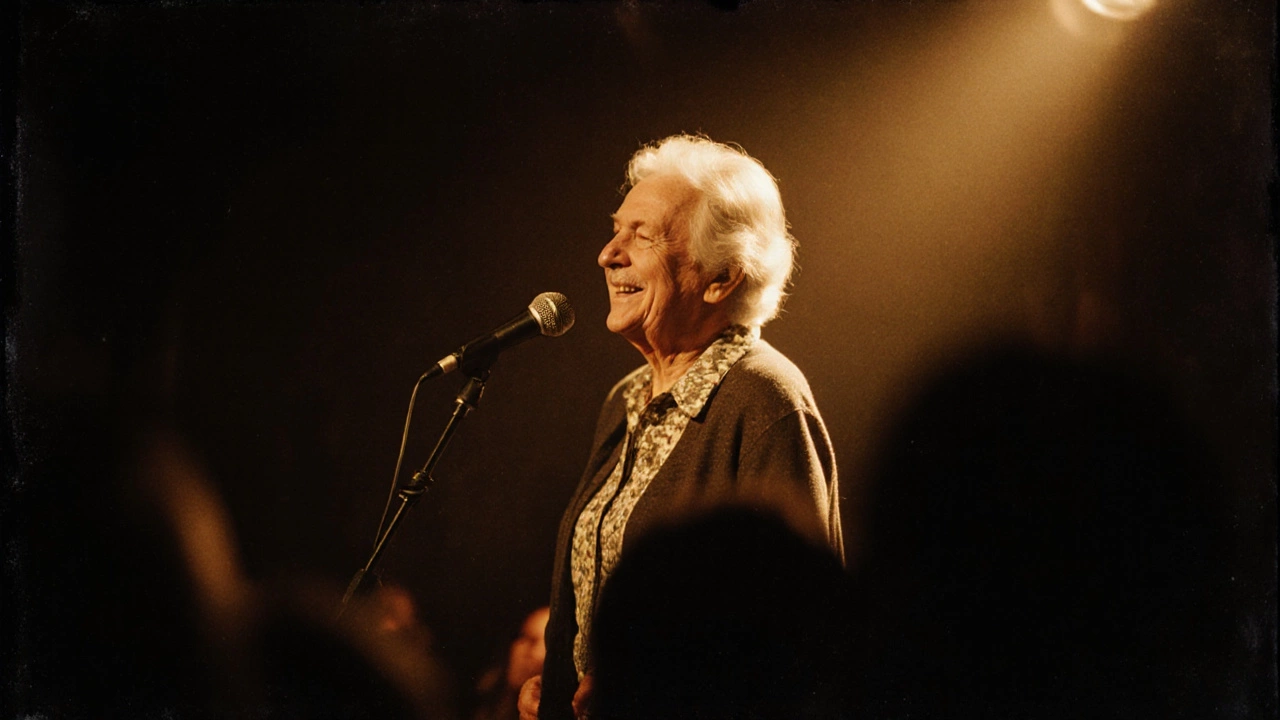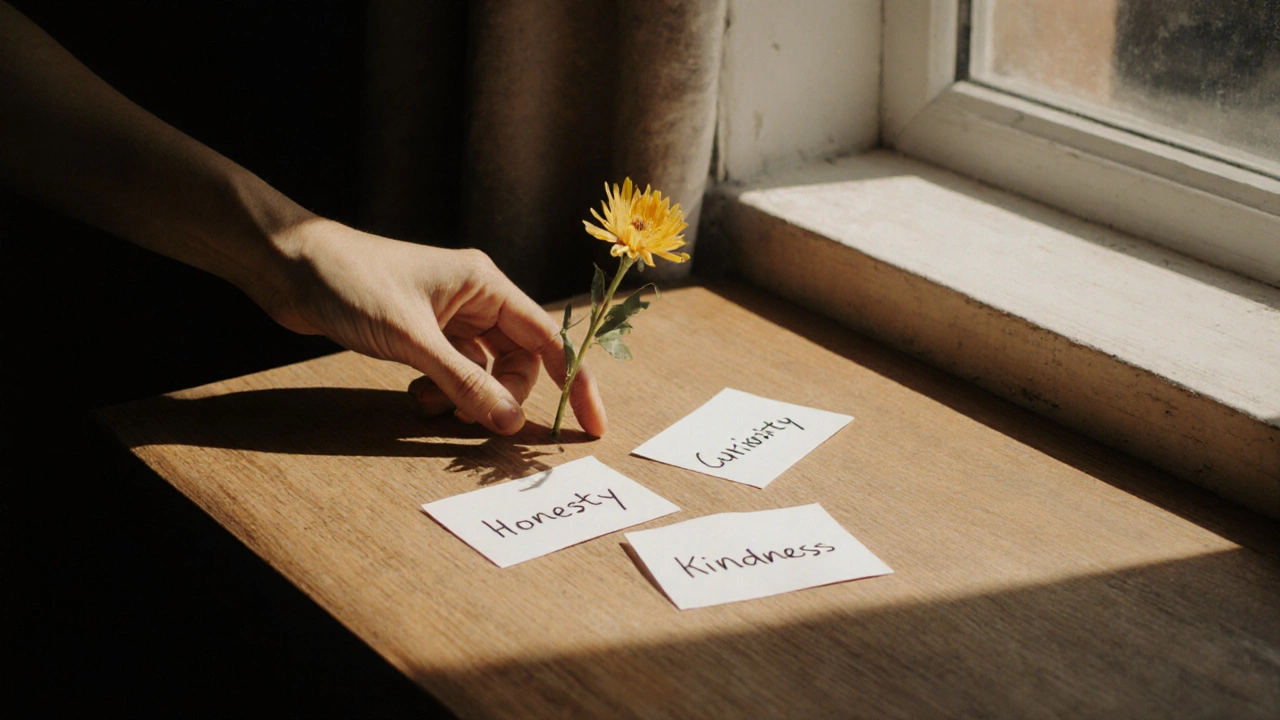Values Alignment Checker
Discover how closely your daily actions match your core values. This tool helps you identify alignment gaps and build authenticity.
Step 1: Identify Your Core Values
Select your top 3 core values from this list. Focus on what truly matters to you, not what you think you should value.
Step 2: Review Your Actions
Reflect on your actions this week. Check which ones aligned with your values.
People often think personality is something you’re born with-fixed, unchangeable, like eye color or height. But that’s a myth. Your personality isn’t carved in stone. It’s shaped by choices, habits, and experiences. You can grow it. Not by pretending to be someone else, but by becoming more of who you already are-deeper, clearer, stronger.
Start by noticing what you avoid
Most of us spend energy running from discomfort. Awkward silences. Tough conversations. Saying no. Being wrong. But growth happens right where you feel the most resistance. The things you avoid? They’re usually the areas where your personality needs to expand.Try this: Write down three situations you consistently dodge. Maybe it’s speaking up in meetings. Asking for help. Sharing your opinion when everyone else disagrees. Now ask yourself: What’s the worst that could happen if you tried it once? Chances are, the fear is worse than the reality. When you face one of these, even once, you change. Not dramatically-but permanently. You prove to yourself you can handle more than you thought.
Read people, not just books
Reading self-help books helps. But real personality growth comes from watching how other people move through the world. Not the loud ones. The quiet ones. The ones who listen more than they speak. The ones who stay calm under pressure. The ones who apologize when they’re wrong.Find one person you admire-not because they’re famous or successful, but because they feel real. Observe them. How do they handle stress? How do they respond to criticism? Do they laugh at themselves? Do they make others feel seen? Take notes. Not to copy them, but to understand what traits you want to grow in yourself. Personality isn’t about being the most charismatic person in the room. It’s about being the person who leaves others feeling a little better after talking to you.
Practice small acts of courage every day
Courage isn’t a grand gesture. It’s not jumping out of a plane. It’s saying, "I’m not okay," when you’re expected to smile. It’s admitting you don’t know something. It’s sending that message you’ve been delaying because you’re afraid of how they’ll react.Start a daily courage log. Each night, write down one small thing you did that scared you a little. Did you ask a question in a group? Did you turn down an invitation you didn’t want to go to? Did you share something personal, even just a little? These aren’t big wins on paper. But over time, they rewire your brain. You stop seeing vulnerability as weakness. You start seeing it as strength.
Stop performing. Start showing up.
A lot of people try to "grow their personality" by adopting trends-quoting philosophers, wearing certain clothes, using buzzwords. But that’s performance, not personality. Real personality doesn’t need an audience. It shows up even when no one’s watching.Ask yourself: When was the last time you did something just because it felt right to you-not because it looked good, or because you thought it would impress someone? That moment? That’s your personality speaking. The more you listen to it, the louder it gets. The more you try to fake it, the quieter it becomes.
Try this: For one week, drop one thing you do just to look interesting. Maybe it’s posting about your "deep thoughts" on social media. Maybe it’s pretending you’ve read a book you haven’t. Just stop. See what happens. You might feel awkward at first. But then you’ll feel lighter. More real.
Build your inner compass
A strong personality doesn’t wobble with the wind. It has a steady center. That center comes from knowing your values-and living by them, even when it’s inconvenient.Take five minutes and write down your top three values. Not what you think you should value. What you actually care about. Maybe it’s honesty. Kindness. Curiosity. Independence. Creativity. Now, look at your week. Did your actions match those values? Did you choose convenience over honesty? Did you stay silent when you should’ve spoken up? There’s no shame in missteps. But if you notice a pattern? That’s your signal to adjust.
Values aren’t slogans. They’re decision filters. When you’re unsure what to do, ask: "Which choice lines up with my values?" Not what looks good. Not what’s easy. What’s true to you.

Embrace the discomfort of becoming
Growing your personality isn’t a project with a finish line. It’s a lifelong process. There will be days you feel stuck. Days you regress. Days you wonder if it’s even worth it.That’s normal. Progress isn’t linear. You don’t become more interesting overnight. You become more interesting because you kept showing up-even when you didn’t feel like it. Even when you were tired. Even when you were scared.
Think of personality like muscle. You don’t build it by lifting heavy weights once a year. You build it by showing up, day after day, with small, consistent effort. One honest conversation. One quiet moment of reflection. One time you chose truth over approval.
You’re not trying to become someone else. You’re trying to become more fully yourself. And that’s the only kind of growth that lasts.
What stops people from growing their personality?
Most people don’t grow because they’re waiting for the right moment. They think they need more confidence before they speak up. More experience before they try something new. More money before they live differently. But confidence doesn’t come before action. It comes after.Waiting for perfect conditions is the biggest barrier to personality growth. You won’t feel ready. You won’t feel sure. That’s not a sign to stop. That’s a sign to start.
How long does it take to see real change?
Change starts in weeks. Real transformation takes months. If you practice even one of these habits consistently for 90 days-daily courage, value alignment, mindful observation-you’ll notice a shift. People will comment on how you’ve changed. You’ll feel different inside. Not because you’ve changed your style. But because you’ve changed your foundation.Can personality change after 30, 40, or 50?
Absolutely. Personality isn’t fixed by age. It’s shaped by attention. People who think they’re "too old" to change are usually just tired. Not broken. The brain doesn’t stop learning at 30. It just gets better at avoiding effort. The older you get, the more you know what matters. That’s an advantage, not a limitation.One of my clients, a 62-year-old retired teacher, started attending open mic nights because she wanted to overcome her fear of speaking. Six months later, she was hosting them. She didn’t become a performer. She became more alive. That’s the goal-not to be extraordinary. But to be fully present.

What’s the difference between personality and character?
Personality is how you show up. Character is what you do when no one’s looking. Personality attracts. Character earns trust. You can have a charming personality and still be unreliable. But a strong character? That’s what keeps people around long-term.Focus on building both. Let your personality be warm and expressive. Let your character be steady and honest. One draws people in. The other keeps them close.
What if I’m naturally shy?
Shyness isn’t the opposite of a strong personality. It’s just a different way of being. Many of the most compelling people are quiet. They don’t fill silence. They deepen it. They listen. They observe. They speak only when they have something real to say.Don’t try to become outgoing. Try to become present. A shy person who listens deeply, speaks honestly, and stays true to their values has a powerful personality. You don’t need to be loud to be memorable.
Should I try new hobbies to grow my personality?
Hobbies help-but only if they challenge you. Painting won’t change you if you’re just doing it to relax. But if you take a class where you have to share your work, or join a group where you have to collaborate, that’s growth. The activity isn’t the point. The discomfort it forces you to face is.Choose hobbies that make you slightly uncomfortable. That’s where the magic happens.
Can you really change your personality, or is it fixed?
Yes, you can change your personality-not by pretending to be someone else, but by choosing new habits that reflect the person you want to become. Research in psychology shows personality traits like openness, conscientiousness, and emotional stability can shift over time with intentional effort. It’s not about flipping a switch. It’s about consistent, small actions that reshape how you think, feel, and respond.
Is being more confident the same as growing your personality?
Confidence is part of it, but not the whole picture. You can be confident and still be shallow, manipulative, or inauthentic. Growing your personality means becoming more honest, more curious, more grounded. Confidence without integrity is just noise. Real personality comes from alignment-between what you believe, what you say, and what you do.
What if people don’t like me when I start being more honest?
Some people won’t. And that’s okay. Not everyone wants to be around someone who stops performing. But the right people-the ones who value truth, depth, and authenticity-will stay. And you’ll attract more of them. You can’t grow your personality by trying to please everyone. You grow it by pleasing yourself first.
How do I know if I’m growing or just changing my behavior?
Behavior changes are surface-level. Growth happens when your motivations shift. If you’re speaking up to impress people, that’s behavior. If you’re speaking up because you finally believe your voice matters-that’s growth. Ask yourself: "Am I doing this because I feel pressured, or because I feel true?" The answer tells you everything.
Can therapy help me grow my personality?
Yes. Therapy isn’t just for crisis. It’s a space to explore who you are beneath the masks. A good therapist helps you see patterns you’ve been stuck in-like avoiding conflict, people-pleasing, or shutting down. Recognizing these patterns is the first step to changing them. Many people who grow their personality do so with the help of therapy, coaching, or deep self-reflection.
Next steps: Start today
You don’t need a plan. You don’t need a budget. You just need one small action. Today.Choose one thing from this article. Maybe it’s writing down your three values. Maybe it’s speaking up in your next meeting. Maybe it’s stopping one performance habit. Do it. Not because it’s easy. But because it’s true.
Personality isn’t something you find. It’s something you build-one honest moment at a time.






